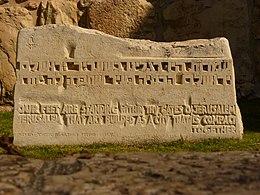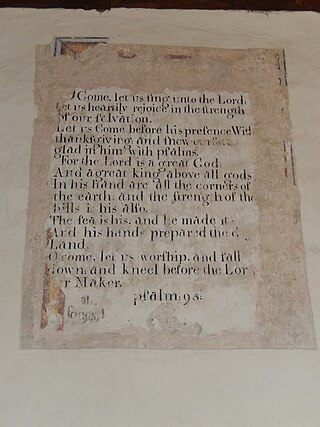
Psalm 95 is the 95th psalm of the Book of Psalms, beginning in English in the King James Version: "O come, let us sing unto the LORD: let us make a joyful noise to the rock of our salvation". The Book of Psalms starts the third section of the Hebrew Bible, and, as such, is a book of the Christian Old Testament. In the slightly different numbering system in the Greek Septuagint version of the Bible, and in the Latin Vulgate, this psalm is Psalm 94. In Latin, it is known as "Venite exultemus" or simply "Venite". The psalm is a hymn psalm, one of the Royal psalms, praising God as the King of His people. Psalm 95 identifies no author, but Hebrews 4:7 attributes it to David. The Vulgate also names David as the author.

Psalm 90 is the 90th psalm of the Book of Psalms, beginning in English in the King James Version: "Lord, thou hast been our dwelling place in all generations". In the slightly different numbering system used in the Greek Septuagint and Latin Vulgate translations of the Bible, this psalm is Psalm 89. In Latin, it is known as "Domine refugium tu factus es nobis in generatione et generatione". It is the opening psalm of Book 4 of the psalms. Uniquely among the Psalms, it is attributed to Moses. It is well known for its reference in verse 10 to human life expectancy being 70 or 80 : it is believed that this verse was the influence for the opening words of Abraham Lincoln's Gettysburg Address.

Psalm 30 is the 30th psalm of the Book of Psalms, beginning in English in the King James Version: "I will extol thee, O LORD; for thou hast lifted me up". The Book of Psalms is part of the third section of the Hebrew Bible, and a book of the Christian Old Testament. In the slightly different numbering system used in the Greek Septuagint version of the Bible and in the Latin Vulgate, this psalm is Psalm 29. In Latin, it is known as "Exaltabo te Domine". It is a psalm of thanksgiving, traditionally ascribed to David upon the building of his own royal palace.

Psalm 92 is the 92nd psalm of the Book of Psalms, beginning in English in the King James Version: "It is a good thing to give thanks unto the LORD". In the slightly different numbering system used in the Greek Septuagint and Latin Vulgate translations of the Bible, this psalm is Psalm 91. In Latin, it is known as "Bonum est confiteri Domino ". The psalm is known as Mizmor Shir L'yom HaShabbat, is ostensibly dedicated to the Shabbat day.

Psalm 126 is the 126th psalm of the Book of Psalms, beginning in English in the King James Version: "When the Lord turned again the captivity of Zion, we were like them that dream". In Latin, it is known as In convertendo Dominus. It is one of the fifteen Songs of Ascent in the Book of Psalms whose opening words in Hebrew are "Shir HaMaalot". In the slightly different numbering system used in the Greek Septuagint version of the Bible and in the Latin Vulgate, this psalm is Psalm 125.
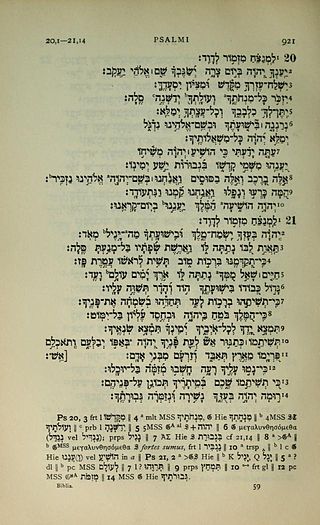
Psalm 20 is the 20th psalm of the Book of Psalms, beginning in English in the King James Version: "The LORD hear thee in the day of trouble". The Book of Psalms is part of the third section of the Hebrew Bible, and a book of the Christian Old Testament. In the slightly different numbering system used in the Greek Septuagint and Latin Vulgate translations of the Bible, this psalm is Psalm 19. In Latin, it is known by the incipit, "Exaudiat te Dominus". The psalm is attributed to David. This psalm and the following one are closely related: they are both liturgical psalms: the first is an intercession, the second is a thanksgiving; in both, the king is the prominent figure.

Psalm 93 is the 93rd psalm of the Book of Psalms, beginning in English in the King James Version: "The LORD reigneth, he is clothed with majesty". The Latin wording is Dominus regnavit, decorem indutus est. The Book of Psalms is part of the Hebrew Bible and the Christian Old Testament. In the slightly different numbering system of the Greek Septuagint and Latin Vulgate versions of the Bible, this psalm is Psalm 92. It is the first of a series of psalms which are called royal psalms as they praise God as King.

Psalm 29 is the 29th psalm of the Book of Psalms, beginning in English in the King James Version: "Give unto the LORD, O ye mighty, give unto the LORD glory and strength". The Book of Psalms is part of the third section of the Hebrew Bible, and a book of the Christian Old Testament. In the slightly different numbering system used in the Greek Septuagint and Latin Vulgate translations of the Bible, this psalm is Psalm 28. In Latin, it is known as "Adferte Domino filii Dei". The psalm is attributed to David. It is a hymn, describing the advent of Yahweh in a storm.

Psalm 33 is the 33rd psalm of the Book of Psalms, beginning in English in the King James Version: "Rejoice in the LORD, O ye righteous: for praise is comely for the upright". The Book of Psalms is part of the third section of the Hebrew Bible, and a book of the Christian Old Testament. In the slightly different numbering system used in the Greek Septuagint and Latin Vulgate translations of the Bible, this psalm is Psalm 32. In Latin, it is known by the incipit, "Exultate iusti in Domino". Its purpose is to praise "the Sovereignty of the Lord in Creation and History".

Psalm 144 is the 144th psalm of the Book of Psalms, part of the final Davidic collection of psalms, comprising Psalms 138 to 145, which are specifically attributed to David in their opening verses. In the King James Version its opening words are "Blessed be the LORD my strength which teacheth my hands to war, and my fingers to fight". In Latin, it is known as "Benedictus Dominus".

Psalm 136 is the 136th psalm of the Book of Psalms, beginning in English in the King James Version: "O give thanks unto the LORD; for he is good: for his mercy endureth for ever. ". The Book of Psalms is part of the third section of the Hebrew Bible, and a book of the Christian Old Testament. In the slightly different numbering system used in the Greek Septuagint and Latin Vulgate translations of the Bible, this psalm is Psalm 135. In Latin, it is known by the incipit, "Confitemini Domino quoniam bonus". It is sometimes referred to as "The Great Hallel". The Jerusalem Bible calls it a "Litany of Thanksgiving". It is notable for the refrain which forms the second half of each verse, translated as "For His mercy endures forever" in the New King James Version, or "for his steadfast love endures for ever" in the Revised Standard Version.

Psalm 135 is the 135th psalm from the Book of Psalms, a part of the Hebrew Bible and the Christian Old Testament, beginning in English in the King James Version: "Praise ye the LORD". In the slightly different numbering system of the Greek Septuagint and Latin Vulgate versions of the Bible, this psalm is Psalm 134. Its Latin title is "Laudate nomen Domini".

Psalm 132 is the 132nd psalm of the Book of Psalms, beginning in English in the King James Version: "LORD, remember David, and all his afflictions". In the slightly different numbering system used in the Greek Septuagint version of the bible and in the Latin Vulgate, this psalm is Psalm 130. In Latin, it is known as "Memento Domine David".

Psalm 128 is the 128th psalm of the Book of Psalms, beginning in English in the King James Version: "Blessed is every one that feareth the LORD; that walketh in his ways". In the slightly different numbering system used in the Greek Septuagint and the Latin Vulgate, this psalm is Psalm 127.In Latin, it is known as "Beati omnes qui timent Dominum".

Psalm 125 is the 125th psalm of the Book of Psalms, beginning in English in the King James Version: "They that trust in the LORD shall be as mount Zion". In Latin, it is known by as, " Qui confidunt in Domino". The Book of Psalms is part of the third section of the Hebrew Bible, and a book of the Christian Old Testament. Psalm 125 is one of fifteen psalms that begin with the words "A song of ascents".

Psalm 123 is the 123rd psalm of the Book of Psalms, beginning in English in the King James Version: "Unto thee lift I up mine eyes, O thou that dwellest in the heavens". The Book of Psalms is part of the third section of the Hebrew Bible, and a book of the Christian Old Testament. This short psalm is one of fifteen psalms that begin with the words "A song of ascents". In Latin, it is known as "Ad te levavi oculos meos", and Baptist writer Charles Spurgeon calls it "the Psalm of the eyes".

Psalm 121 is the 121st psalm of the Book of Psalms, beginning in English in the King James Version: "I will lift up mine eyes unto the hills, from whence cometh my help”. In the slightly different numbering system used in the Greek Septuagint and Latin Vulgate translations of the Bible, this psalm is Psalm 120. In Latin, it is known as Levavi oculos meos in montes.
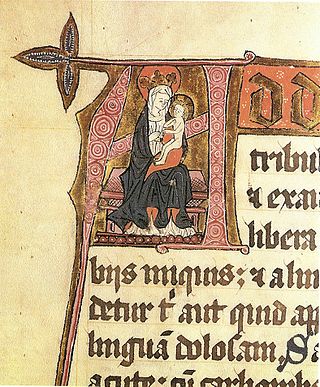
Psalm 120 is the 120th psalm of the Book of Psalms, beginning in the English of the King James Version: "In my distress I cried unto the LORD, and he heard me". In the slightly different numbering system used in the Greek Septuagint and Latin Vulgate translations of the Bible, this psalm is Psalm 119. In Latin, it is known as "Ad Dominum cum tribularer clamavi". It is one of 15 psalms categorized as Song of Ascents.

Psalm 79 is the 79th psalm of the Book of Psalms, beginning in English in the King James Version: "O God, the heathen are come into thine inheritance". In the slightly different numbering system used in the Greek Septuagint and Latin Vulgate translations of the Bible, this psalm is Psalm 78. In Latin, it is known as "Deus venerunt gentes in hereditatem tuam". It is one of the 12 Psalms of Asaph. The New American Bible calls it "a prayer for Jerusalem".
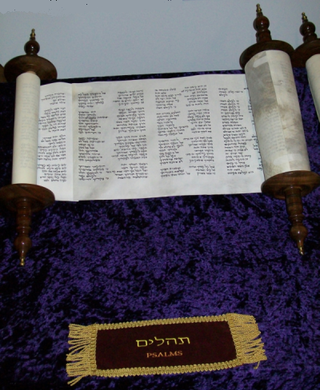
Psalm 116 is the 116th psalm of the Book of Psalms, beginning in English in the King James Version: "I love the LORD, because he hath heard my voice and my supplications". It is part of the Egyptian Hallel sequence in the Book of Psalms.
